How to find newspapers in Google Books for free
Show Notes: Google Books is known for having millions of free digitized books. But did you know that it’s also packed with hidden old newspapers? Since newspapers don’t typically appear in your initial search results in Google Books, I’ll show you two ways to filter down to only newspapers. Plus I’ll also show you some of the most effective ways to quickly find the right ancestor and the right article.
Watch the Video
Show Notes
Downloadable ad-free Show Notes handout for Premium Members.
Old newspapers are a tremendous resource for family history information. One of the most surprising places that you can find old newspapers is Google Books. However, newspapers don’t typically show up in the general searches we run at Google Books. It’s important to use specific strategies designed to effectively and find what you’re looking for.
We typically think of Google Books as a place where you look for books. However, we really need to change our thinking on that. Think of Google Books as a place to find printed material. At Google Books you could find not only books, but printed newspapers, catalogs, almanacs, magazines, anything that would have been published on paper. Google Books catalogs all the printed material it finds, and digitizes that which isn’t under copyright restrictions. That means that it’s more common to find older newspapers, books and so on that are digitized and searchable.
Dealing with Too Many Results
I love finding articles like this one about my husband’s grandfather, Raymond H. Cooke.
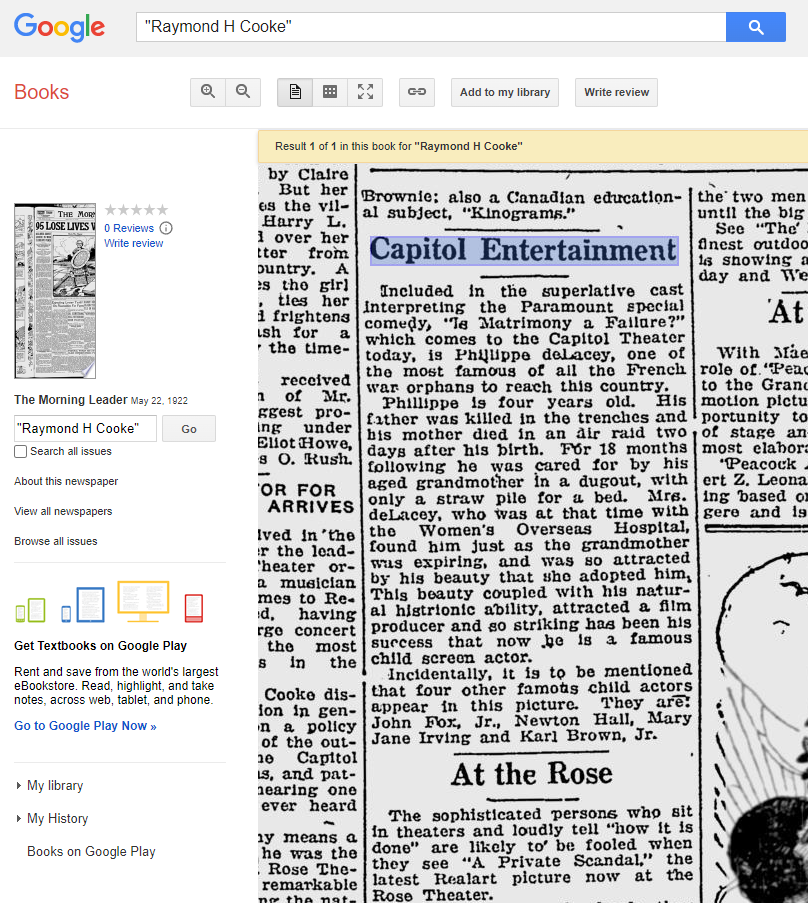
You can find newspaper articles like this at Google Books.
Newspapers clearly offer a lot more than just obituaries. You may be able to find all kinds of articles on what was going on in their life and their community.
We start searching at the Google Books homepage. There are a couple of different ways to find Google Books. You can just google Google Books, or you can go directly to the URL https://books.google.com/.
At Google Books, you can start by typing in an ancestor’s name such as Raymond H. Cooke, or topic of interest. What you will typically see is a list of books, many fairly recent, but no newspapers. In fact there will be typically be an abundance of results, many of which are not a good match. But don’t worry, we can improve these results.
Better Newspaper Results with Quotes
One of the easiest ways to fix this situation is to go back up to the search box and put quotes around the full name. This tells Google Books that I want this exact phrase (name), spelled the way I spelled it. This prevents us from getting results that contain the words but not within the context as a whole name. It also ensures that Cooke will be spelled with an “e”. Without the quotes we get too many non-matching results. Most included one or more of the words, often separate from each other, and some weren’t even spelled the way I spelled the name.
As you can see, using quotes is very effective at reducing unwanted results. However, we can do even more to improve newspaper search results at Google Books.
You’ll notice that most of the results you receive are books, some of which may be digitized and some that are not. What you don’t see typically are newspapers. So, our next strategy will fix this and give us only newspaper results.
Filtering to Only Newspaper Results
It might seem logical just to add the word newspaper to your search query. However, this doesn’t work. Google looks for the words in the text of the material. It doesn’t look at the word newspapers and understand that it’s a type of material.
However, Google Books does give us ways to filter results down to only newspapers. On the search results page you will see a filter menu below the main menu of tabs. If you don’t see it, click the Tools button.
Notice that Any Document is one of the filters. That means that right now our results are showing all types of documents that meet our search criteria including books, catalogs, magazines, newspapers, etc. Click that drop-down menu and select Newspapers. This will display only newspaper in the search results.
At the top of the results list you’ll see exact matches to your query. Sometimes, if there aren’t a lot of matches, Google will then remove the quotes you used, and show you additional results that match without quotes. So several pages of matches doesn’t always mean that they all match exactly. But the good news is, all the exact matches will display first.
Search Name Variations
My example of searching for “Raymond H. Cooke” is very specific. In order to find all the possible articles that mention Raymond, I will need to expand my search to include the name variations that might appear in the papers. Here are just a few examples:
- “Raymond Cooke”
- “Ray Cooke”
- “R. H. Cooke”
- “Raymond H. Cook” (because it’s very possible a spelling error could be made in the newspaper)
Another Way to Filter to Only Newspapers
Google Book’s Advanced Search is another way to filter down specifically to newspapers. It’s not as easy to find or use as the Tools menu, but it can prove very helpful.
There isn’t a link to Advanced Search on the Google Books home page. There are three ways to get to it.
#1 Use the URL
You can use the URL, but it’s not easy to remember. https://books.google.com/advanced_book_search A nice solution is to go there with this link and then add it as a bookmark in your web browser bar.
#2 Google Google Books Advanced Search
The easiest way to find the Advanced Search page for the Google Books is simply to google it.
#3 Any Google Books Catalog Page
The Advanced Search link appears in the search box on the catalog page of all items in Google Books. To find the page, run a search (it doesn’t matter what item you search for) and click the book or other item to open it. If the item is “full view” or “preview” you’ll need to close it. You can do that in the most recent version of the Google Books user interface by clicking the X in the top right corner of the page. This will then display the catalog page for the item, and you’ll see the Advanced Search link in the search field.
The Advanced Search page provides you with a special form. You can use this to run your search as well. You can type the names or phrases that you want to be exact in the Exact Phrase field. Best of all, in the Content section you can click the button for Newspapers to filter your results only to newspapers.
So already, we’re quickly finding newspapers within this massive catalog of over 25 million items in Google Books. I have a few more suggestions of ways to find what you’re looking for in newspapers specifically.
Adding Location to Search
If you want to be look for ancestors in Google Books, it really helps to add a location.
When you look at the search results, you’ll notice that it doesn’t give you a location in the result’s short descriptive paragraph (called a snippet). That makes it a little more challenging to be able to figure out if the items is talking about the right person. Where our ancestors lived is part of what sets them apart from everyone else by the same name. The result usually doesn’t tell us even where the newspaper was published. Try adding the name of your ancestor’s town, county or state to your search query.
Adding Timeframe to Search
While the snippets on the results page show the date of the item, we might have a lot of items to look through. It would be nice to narrow it down to items published during your ancestor’s lifetime. It’s not to say that there might not be a newspaper article published after an ancestor’s death, but it can help to start by first just searching during their lifetime.
On the initial results page, make sure the Tools filter menu it turned on. You’ll find Anytime in the filter menu next to Any Document. Click the Anytime drop-down menu. Here you can select a century. Click Custom Range and enter the years. For example, 1865 to 1930. This will filter your results list down to newspapers published between those years. It’s another great way to filter out results for other people with the same name who didn’t live at the same time. Filtering for both timeframe and the location can really help you zero in on the right person.
The Source of the Newspapers at Google Books
Google Books has not always had newspapers as part of their collection. The digitized newspapers found there today come from the old Google News Archive. This was a newspaper digitization project that was discontinued several years ago. In the last few years they’ve been adding the collection to Google Books. And now with the new Google Books user interface, they are easier to search and use than ever before.
The old Google News Archive can be found at https://news.google.com/newspapers. This old website can come in handy if you’re not sure if Google Books has the issues that you need of a particular newspaper title.
Start by going to https://news.google.com/newspapers and click the letter at the top of the screen that corresponds to the first letter of the first word in the title of the newspaper. For example, if you want to check to see if they have The Lawrence Daily Gazette, and if so which issues, you would click “L”. If you find the newspaper the website will also tell you how many issues are in the collection and what dates they cover. Then you can head to Google Books and search on the title.
It’s possible that Google may have added additional issues since the old Google News Archive closed. You can check this at Google Books by searching on the title and using the Any Time filter to specify the years.
Start Searching for Newspapers at Google Books
Now you can find newspapers at Google Books quickly and efficiently. I hope you’ll leave a comment and let me know about the article that you find!
Resources
Downloadable ad-free Show Notes handout for Premium Members.
Adoption of Washington State Native Americans Among New and Updated Genealogical Record Collections This Week
Adoption of Washington State Native Americans records are now available for genealogical research. Also this week you can fill up on North Carolina school books, California land dockets, Florida newspapers, Canadian Aboriginal Peoples records, Lower Canadian census for 1825, and new additions to historic British newspapers.
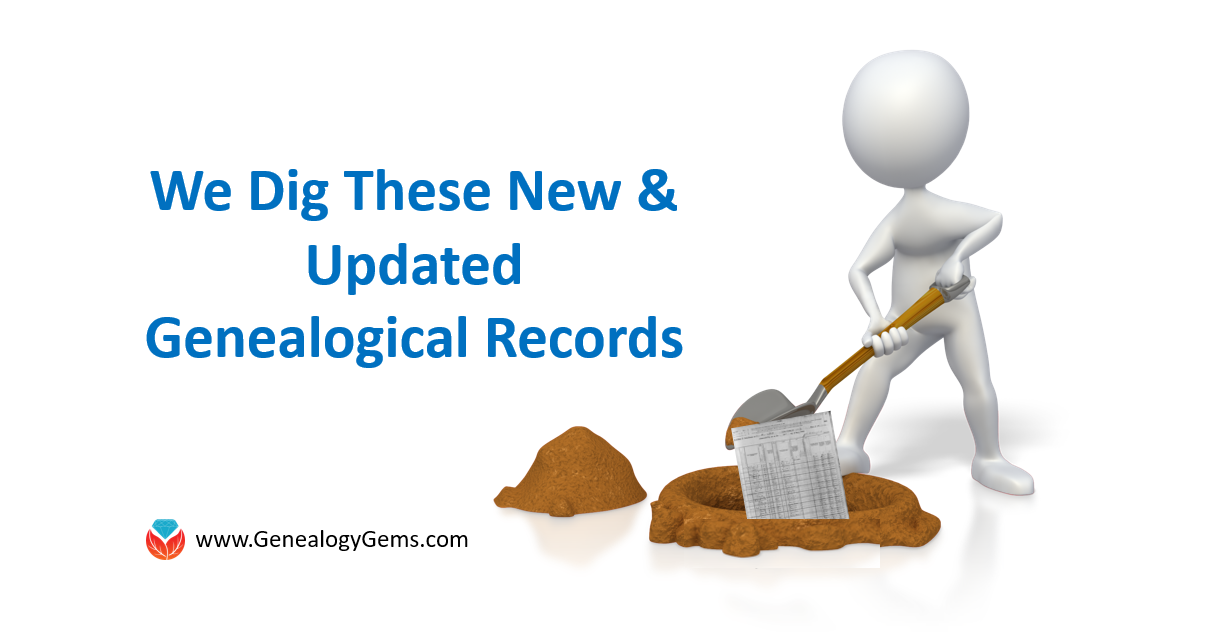
United States – Adoption of Washington State Native Americans
Washington, Applications for Enrollment and Adoption of Washington Indians, 1911-1919 is now available at FamilySearch.org. This collection consists of records created during the creation of the Roblin Rolls of Non-Reservation Indians in Western Washington. The enrollment and adoption proceedings of Indian tribes in Western Washington that were not on tribal census records makes this collection unique. It is arranged by tribal name claimed by the applicant, and then by applicant’s name.
Records may contain:
- English name of the primary individual or family members
- Indian name of the primary individual or family members
- Birth, marriage, or death dates
- Birth, marriage, or death places
- Place of residence
- Ages
- Number of children in the family
- Occupation
- Other biographical details about the family or individuals such as migrations
- Tribal affiliation
- Religious affiliation
- General information about the tribe
United States – North Carolina – School Books
North Carolina Digital Heritage Center features highlights from the collections at DigitalNC, an online library of sources from across North Carolina. This week, the archive has added almost 90 years worth of “BlueBooks” from St. Mary’s School in Raleigh. The years covered are 1911-2000.
St. Mary’s School was both a high school and a college. In particular, the Student Blue Books could be especially useful for genealogists or historians, as they document the names, activities, and some addresses of the students.
United States – California – Land Docket
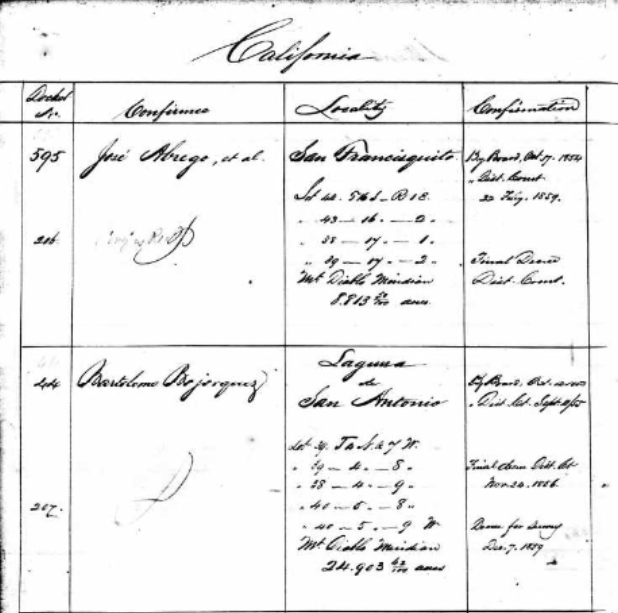
California, Private Land Claim Dockets, 1852-1858 for José Abrego at Ancestry.com
Each record in the index usually includes the name of the landowner, their docket number, and the record date.
United States – Florida – Newspapers
Do you have ancestors from Florida? Newspapers.com now has the Palm Beach Post. With a basic subscription, you can see issues of the Palm Beach Post from 1916 through 1922; or, with a Publisher Extra subscription, access earlier years and additional issues from 1922 to 2016.
Florida’s Palm Beach Post first began publishing in 1908 with the name Palm Beach County, and in 1916 (by this time called the Palm Beach Post) the paper made the switch from running weekly issues to daily.
Canada – Aboriginal Records
Library and Archives Canada added over 600 documents from the Royal Commission on Aboriginal Peoples recently. These records can be viewed at the Library and Archives Canada website.
These records include transcripts of more than 175 days of public hearings, consultations and roundtables; research studies by academics and community experts; and submissions by non-governmental organizations. Until now, patrons could only access this collection in person at LAC’s downtown Ottawa location, or by submitting a reprography request. This is a wonderful asset to the many helpful collections online for Canadian researchers.
Lower Canada – Census
The Lower Canadian Census of 1825 from Findmypast contains over 74,000 records covering modern day Labrador and southern Quebec. Each search result will provide you with an image of the original document and a transcript. Information may include the language your ancestor spoke, where they lived, and with how many people they lived. It does not name each of the inhabitants in the home by name, but they are marked by age.
1.2 million Irish immigrants arrived from 1825 to 1970 according to Wikipedia. The peak period of entry of the Irish to Canada in terms of numbers occurred between 1830 and 1850, when 624,000 arrived. Quebec was a port of entry. So, if you have Irish immigrants who you think may have come to Canada by 1825, this might be a great census for you to look at.
Britain – Newspapers
Over 1.5 million new articles have been added to the military publications available at Findmypast in their historic British Newspapers. The Naval & Military Gazette and Weekly Chronicle of the United Service are two of the new titles added. Additional articles come from the Army and Navy Gazette.
More on Native American Research Collections
This week’s records featured Adoption of Washington State Native Americans. But whether you are searching for your Native heritage in Canada, the Western United States, or the Southeastern United States, we know you want the best in education and helpful tips. We have created a three-part series regarding how to use the Native American collections on Fold3.com here:
- How to Use the Dawes Collections for Native American Research
- Eastern Cherokee Applications for Native American Research
- Guion Miller Roll for Native American Research
Disclosure: This article contains affiliate links and Genealogy Gems will be compensated if you make a purchase after clicking on these links (at no additional cost to you). Thank you for supporting Genealogy Gems!
New Digital Archives for Genealogy: Canada, Oregon, Virginia
New digital archives for genealogy host Canadian photos and history magazines, Oregon historical records, and Virginia newspapers. Also this week: Google Maps additions in Canada; Norfolk, England records; England and Wales criminal records; Scottish Presbyterian church records and Glasgow newspapers; and criminal records from England/Wales.
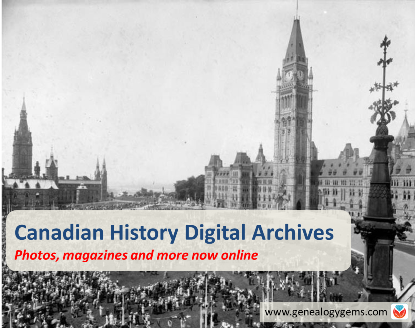
Canada: History Magazines in Digital Archive
Canada’s History Society has launched a new, mobile-responsive digital archive. Canada’s History launches with the entire run of a unique magazine: The Beaver, which explored the history of the Far North from fur-trade colonial days to modern times. “In addition to The Beaver, the archive will feature issues of Canada’s History magazine as well as Kayak: Canada’s History Magazine for Kids,” says a news article. The project was partnered by the Hudson’s Bay Company History Foundation. Its website is also worth exploring if your family history reaches into that part of the world.
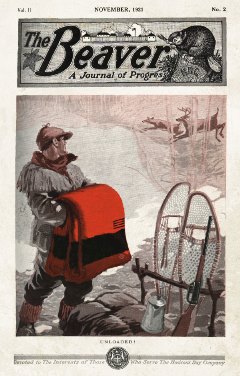
Image courtesy Canada’s History Society.
Canada: Photo Archive
More than 100,000 digitized photos represent the beginning of a new Canada photo archive available to subscribers of The Globe and Mail, which is celebrating its 173rd birthday this year along with the country’s 150th. According to a news article, photo topics “range from a 1901 picture of the Forester’s Arch being erected on Bay and Richmond streets for a royal visit to a Canadian astronomical discovery in the late 1990s. You can search the archive by date or Globe photographer, and there are special collections that cover different aspects of Canadian life.”
England: Norfolk Records
Subscription website Findmypast.com has added to these collections of genealogical records on Norfolk, England (see a Findmypast special offer at the bottom of this post):
- Norfolk Marriage Bonds, 1557-1915. “Browse 444 volumes of marriage bonds from four ecclesiastical courts: the Archdeaconry of Norfolk Court, the Archdeaconry of Norwich Court, the Dean & Chapter of Norwich, and the Diocese of Norwich Consistory Court.”
- Norfolk Non-Conformist Church Records, 1613-1901. Browse “11 registers covering various denominations including Methodist, Quaker, and Baptist in the parishes of Attleborough, Aylsham, Kenninghall, Norwich, Tasburgh, Walsingham, and Wymondham.”
- Norfolk Poor Law Union Records, 1796-1900. Browse “55 volumes covering 20 unions across Norfolk to discover whether your ancestors fell on hard times. Explore 10 different types of records, ranging from baptism and report books to relief lists and court orders.”
England and Wales: Criminal Records
Findmypast.com has finished adding a final installment to its Crimes, Prison and Punishment Collection. About 68,000 records were added that may help you “uncover ordinary and extraordinary stories of criminals, victims and law enforcers from Georgian highway robbers to Victorian murderers, Edwardian thieves, and a whole host of colorful characters in between!”
Scotland: Glasgow Newspapers
The British Newspaper Archive has added the following to its collection of Glasgow newspapers:
- Glasgow Evening Citizen: added the years 1879-1892, so the current collection now tops 20,000 pages and covers 1866-1890.
- Glasgow Evening Post: added the years 1881-1890. The total collection of over 14,000 pages and covers 1867-1890.
Scotland: Presbyterian Church Records
More than 36,000 Presbyterian church records, covering 1744 to 1855, have been added to ScotlandsPeople, a website maintained by the National Records of Scotland. “The 20,255 births and baptisms (1744–1855), 10,368 marriages and proclamations (1729–1855) and 5,422 death and burial records (1783–1855) may be especially helpful for anyone searching for a person who was born or baptized, married, or died before the introduction of statutory registration in 1855,” states an article on the site.
 United States: Oregon Digital Archive
United States: Oregon Digital Archive
The Oregon Historical Society has just launched OHS Digital Collections, a new resource for researching Oregonians on your family tree. “This new website allows online public access to a rich variety of materials from the OHS Research Library, including items from the manuscript, photograph, film and oral history collections,” states a Hillsboro Tribune article. More content is planned for this new site, so check back periodically.
United States: Virginia Newspapers
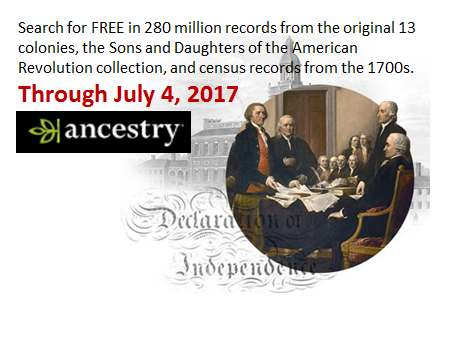 The Virginia Newspaper Project is putting the Library of Virginia’s collection of Civilian Conservation Corps (CCC) newspapers on Virginia Chronicle, a free digital newspaper archive with nearly a million pages. According to an announcement, “The camp newspapers in the LVA’s collection, published from 1934 to 1941 by the young men of the CCC, were mostly distributed in camps throughout the Commonwealth, though a handful are from locales outside Virginia….[The camp newspapers] offer a vivid picture of camp life during the Depression…[and] are also packed with the names of people who were active in the CCC–you might find a mention of one of your relatives among the pages. Click here to learn more about the CCC and the newspapers they produced.”
The Virginia Newspaper Project is putting the Library of Virginia’s collection of Civilian Conservation Corps (CCC) newspapers on Virginia Chronicle, a free digital newspaper archive with nearly a million pages. According to an announcement, “The camp newspapers in the LVA’s collection, published from 1934 to 1941 by the young men of the CCC, were mostly distributed in camps throughout the Commonwealth, though a handful are from locales outside Virginia….[The camp newspapers] offer a vivid picture of camp life during the Depression…[and] are also packed with the names of people who were active in the CCC–you might find a mention of one of your relatives among the pages. Click here to learn more about the CCC and the newspapers they produced.”
 Special offer: Through July 2, 2017, get your first month of Findmypast.com World Subscription for just $1.00! In addition to unparalleled record content for England, Scotland, Ireland and Wales, Findmypast has added tons of great content to its US and Canada collections.
Special offer: Through July 2, 2017, get your first month of Findmypast.com World Subscription for just $1.00! In addition to unparalleled record content for England, Scotland, Ireland and Wales, Findmypast has added tons of great content to its US and Canada collections.
- US/Canada Users: CLICK HERE
- UK Users: CLICK HERE
- Australia Users: CLICK HERE
Bonus! Get an exclusive subscriber-only webinar, 20 Unmissable Resources for Tracing Your British and Irish Ancestors, when you sign up!
Full disclosure: This post contains affiliate links and Genealogy Gems will be compensated if you make a purchase after clicking on these links. Thank you for supporting Genealogy Gems!
